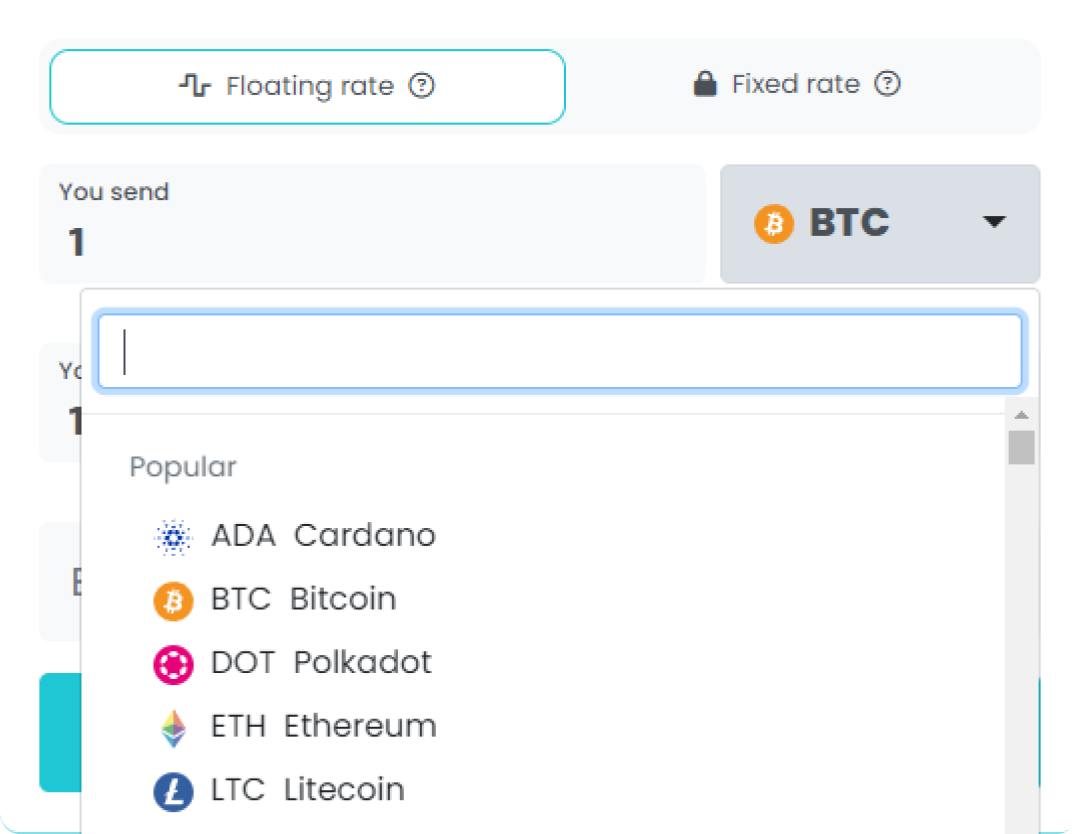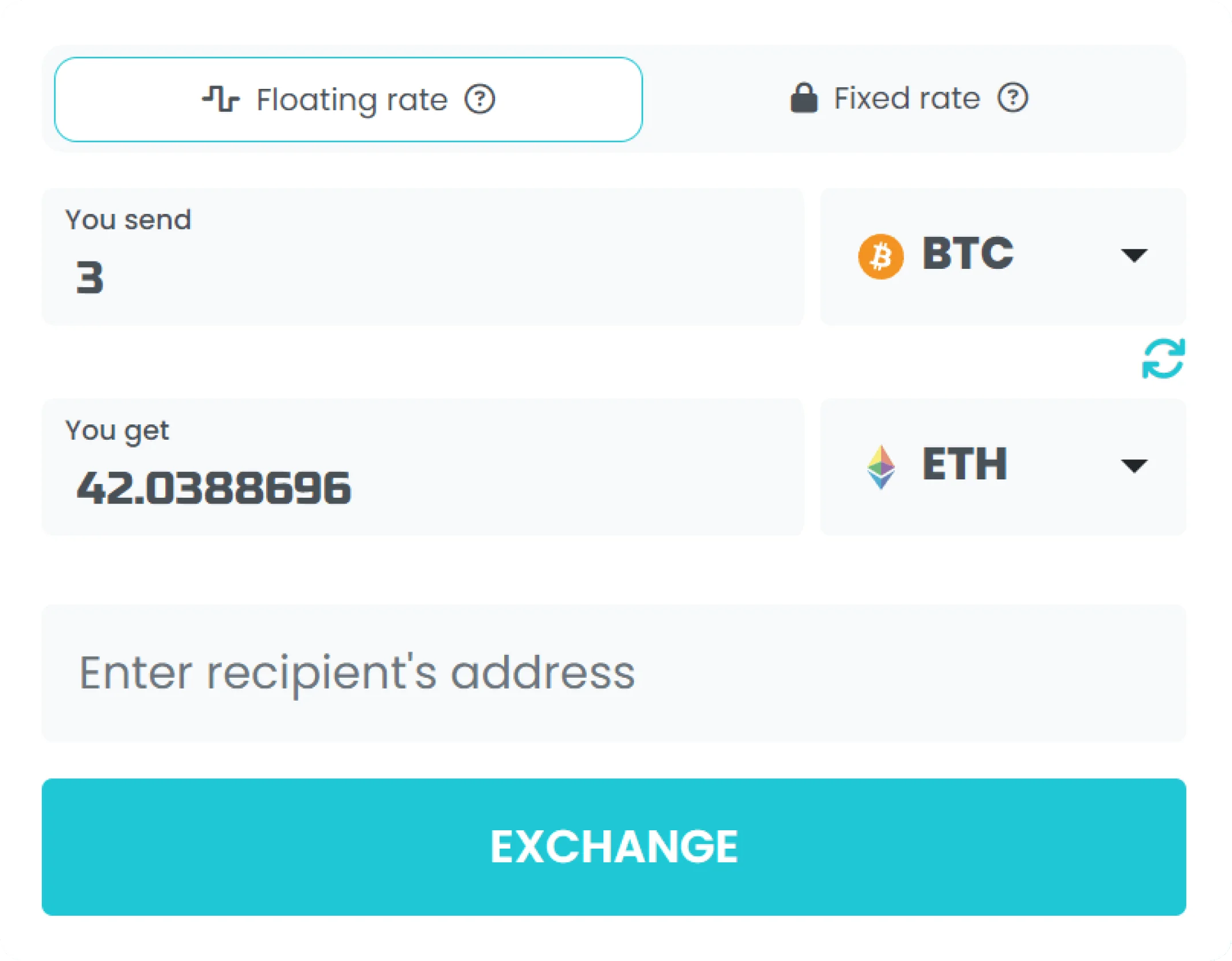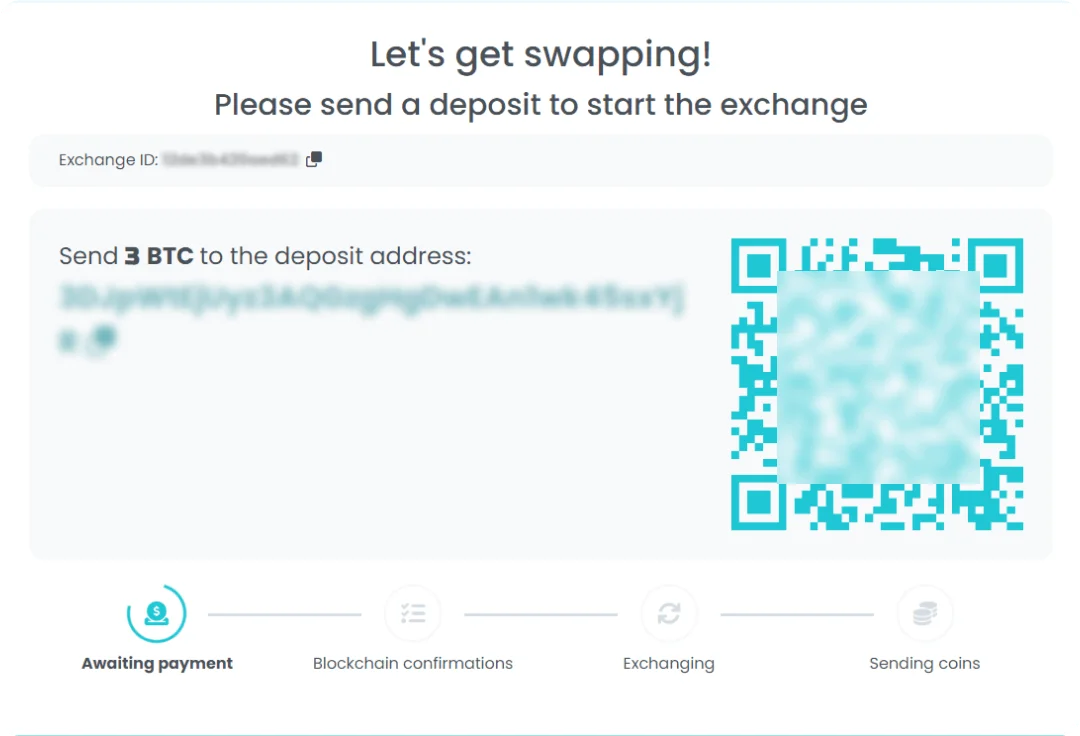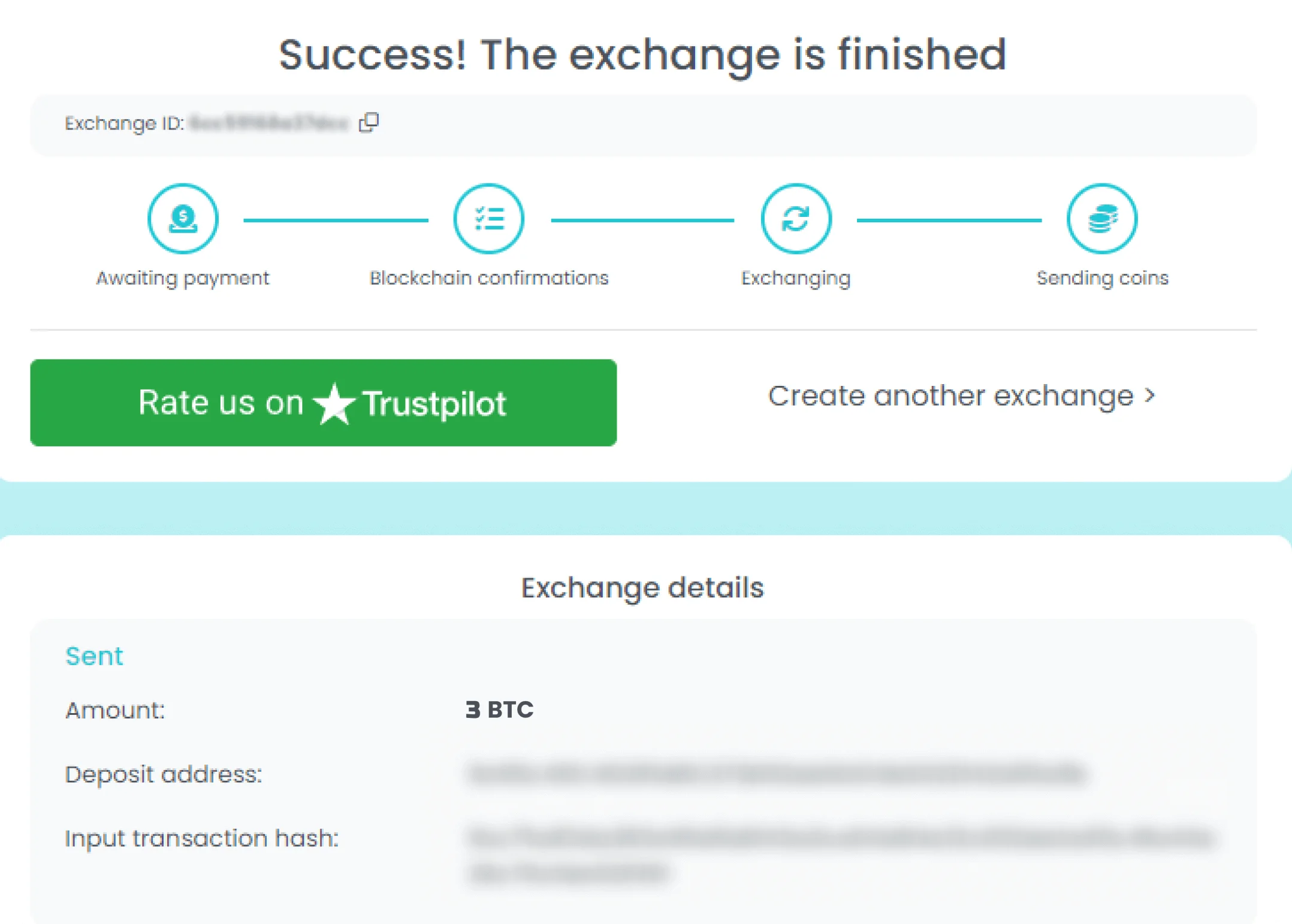How to Exchange Arbitrum (ARB)
Exchange ARB instantly
Swap Arbitrum (ARB) in a few clicks on Exchang.io.
Registration and limits free service.
Historical Price Chart
Arbitrum Current Market Data
| Name | Arbitrum |
|---|---|
| Price | $1.79 |
| Price Change 24h | -0.24% |
| Price Change 7d | 1.56% |
| Price Change 30d | 18.01% |
| Price Change 60d | 75.21% |
| Market Cap | $2,282,639,484.25 |
| Circulating Supply | 1,275,000,000.00 ARB |
| Volume 24h | $351,156,524.66 |
How to Exchange Arbitrum in Just a Few Straightforward Steps
If you are looking to ARB exchange, you are in the right place. Swap Arbitrum in a matter of minutes using Exchang.io crypto exchange. Just adhere to these 4 simple steps.




Benefits of Exchanging ARB on Exchang.io

Simple
We make sure not to overload our website with unnecessary elements. Only the things you need for smooth Arbitrum conversions.Simple and clear.

Secure
Exchang.io is a safest place to exchange ARB. Get ARB anonymously, without KYC and registration.
In touch
Write to us in any unclear situation with ARB swaps. Our support team is happy to help you 24/7.
Fast
We are constantly upgrading our platform to make Arbitrum exchanges really fast. The average speed for the swap is about 5-15 minutes.Popular Arbitrum trading pairs
Here are some popular ARB trading pairs. You can buy ARB with every listed coin on Exchang.io.
How Much Arbitrum Can I Exchange on Exchang.io?
Exchanging Arbitrum on Exchang.io is unlimited. You can start swapping ARB right now starting from the lower limit of ≈ $3.
There are no upper limits for Arbitrum exchanges at Exchang.io. Exchange Arbitrum with other cryptocurrencies from the list of over 700 coins as much as you want to.
Cross-chain exchanges are available; just choose any coin on any network and click the Exchange button, and we'll do the rest for you
Why exchange Arbitrum?
Things you will be able to do with exchanged ARB:
You could use your Arbitrum cryptocurrency to buy goods and services from merchants who accept it as a form of payment. As more businesses start accepting cryptocurrencies, this could become an increasingly common use case for Arbitrum and other digital assets.
Another thing you could do with your Arbitrum cryptocurrency is hold onto it as a long-term investment. Depending on market conditions and other factors, the value of your holdings may appreciate over time, potentially providing a return on your investment.
You could also trade your Arbitrum tokens on cryptocurrency exchanges, buying and selling them in order to take advantage of fluctuations in their market value. This can be a risky strategy that requires careful research and analysis, but it can also be a way to earn profits in the short term.
Finally, you could use your Arbitrum cryptocurrency to participate in decentralized applications (dApps) built on the Arbitrum network. These dApps are designed to provide a range of services, such as lending and borrowing, gaming, and social networking, all without the need for intermediaries like banks or social media platforms.
What is Arbitrum?
Arbitrum is a layer 2 scaling solution for Ethereum, designed to improve the network's transaction processing capacity and reduce fees. It uses Optimistic Rollups, a technology that bundles many transactions into a single batch, before submitting them to the Ethereum blockchain.
The Arbitrum network comprises two key components- the Arbitrum Sequencer, which processes transactions and generates proofs, and the Arbitrum Chain, where these proofs are verified and executed. This architecture allows for faster transaction processing times and lower fees compared to on-chain transactions.
The native cryptocurrency of the Arbitrum network is called Ether (ETH), similar to Ethereum. However, it also has its own token called Arbitrum Token (ARB). ARB is used for governance and to incentivize users to participate in the network by staking tokens. Users who stake their ARB tokens can earn rewards in ETH.
One of the benefits of using Arbitrum is its compatibility with existing Ethereum applications and smart contracts. Developers can easily migrate their Ethereum-based projects to Arbitrum without significant changes to their codebase, maintaining interoperability between the two networks.
Another advantage of Arbitrum is its ability to mitigate the problem of "front-running", where traders use bots to exploit price movements by placing trades ahead of other users. Arbitrum uses verifiable delay functions (VDFs) to randomize the order in which transactions are processed, making it harder for bots to predict outcomes.
The development of Arbitrum was led by Offchain Labs, a blockchain research and development firm founded in 2018 by Edward Felten, Steven Goldfeder, and Harry Kalodner. The team includes several experts in cryptography, distributed systems, and programming languages, and has received funding from prominent venture capital firms such as Lightspeed Venture Partners and Pantera Capital.
To use Arbitrum, users need to connect to an Arbitrum-compatible wallet, such as MetaMask, and switch to the Arbitrum network. They can then interact with dApps and smart contracts on the network as they would on Ethereum, with faster transaction times and lower fees.
Arbitrum has gained significant attention from the Ethereum community since its mainnet launch in September 2021. Several popular dApps and DeFi projects, such as Uniswap and Chainlink, have already integrated with the network, contributing to its growth and adoption.
However, like any emerging technology, Arbitrum also faces challenges and risks. One of the concerns is the potential centralization of the network, as validators need to be selected by the Sequencer to process transactions. The team has implemented measures to prevent this, but it remains a topic of debate among the community.
Another issue is the security of the network, as any vulnerabilities or bugs in the code could lead to loss of funds or other negative outcomes. The team has conducted extensive testing and auditing to reduce the risk of such incidents, but the risk can never be completely eliminated.
Overall, Arbitrum represents a promising solution to improve the scalability and usability of the Ethereum network, while maintaining interoperability with existing applications and smart contracts. Its success depends on continued innovation, adoption by the community, and effective management of the risks and challenges it faces.
Brief History of Arbitrum
Arbitrum is a layer 2 scaling solution for Ethereum that allows for faster and cheaper transactions. It was founded by Offchain Labs in 2019 and launched its mainnet in May 2021. The native cryptocurrency of the Arbitrum network is ARB.
The development of Arbitrum began in response to the growing problem of high gas fees on the Ethereum network. The team recognized a need for a more efficient and scalable solution, and developed Arbitrum as a sidechain to Ethereum.
Unlike other layer 2 solutions such as Optimism or Polygon, Arbitrum uses a unique approach called optimistic rollups. This allows for faster transaction processing without sacrificing security or decentralization.
With optimistic rollups, transactions are initially processed off-chain, with a fraud-proof submitted to the Ethereum network for verification. This allows for much faster transaction times and greatly reduces gas fees.
ARB was initially distributed through a private sale in 2020, raising $120 million from investors such as Pantera Capital, Sequoia Capital, and Coinbase Ventures. In August 2021, ARB became available for trading on major exchanges such as Binance, Huobi Global, and Coinbase.
As of June 2023, ARB has a market capitalization of over $10 billion, making it one of the largest cryptocurrencies in the world. It has seen significant growth since its launch, with its price increasing from around $3 in early 2021 to over $500 in June 2023.
Beyond its use as a currency, ARB also has utility within the Arbitrum network. Holders of ARB can stake their tokens to help secure the network and earn rewards. They can also participate in governance by voting on proposals related to the future development of the network.
The Arbitrum network has already gained significant adoption, with many popular decentralized applications (dapps) such as Uniswap, Aave, and SushiSwap launching on the network. This has helped to further increase demand for ARB.
One of the key advantages of Arbitrum over other layer 2 solutions is its interoperability with Ethereum. Developers can easily port their dapps from Ethereum to Arbitrum, allowing them to take advantage of faster and cheaper transactions without having to completely rewrite their code.
In addition to its use as a scaling solution for Ethereum, the Arbitrum team also sees potential for the network to be used for applications beyond cryptocurrency. For example, it could be used for supply chain management or other types of data tracking.
As with any cryptocurrency, there are potential risks associated with investing in ARB. The market is highly volatile, and there is always the risk of regulatory action or technical issues affecting the value of the token.
However, the strong fundamentals of the Arbitrum network and its growing adoption suggest that ARB may continue to see significant growth in the coming years. As more developers and users look for ways to avoid high gas fees and slow transaction times on Ethereum, layer 2 solutions like Arbitrum are likely to play an increasingly important role in the ecosystem.
Overall, the development of Arbitrum and the growth of ARB demonstrate the ongoing innovation and evolution of the cryptocurrency ecosystem. By providing a more efficient and scalable solution for decentralized applications, Arbitrum has the potential to unlock new use cases and opportunities for blockchain technology.
Arbitrum Key Advantages and Unique Features
Arbitrum is a Layer 2 scaling solution for Ethereum that aims to provide faster and cheaper transactions while maintaining the security and decentralization provided by the Ethereum network. One of the key advantages of Arbitrum is its ability to achieve high throughput without sacrificing trustlessness. This is achieved through its use of Optimistic Rollups, a scaling technique that allows many transactions to be bundled together and then submitted to the Ethereum network as a single transaction.
Another advantage of Arbitrum is its compatibility with existing Ethereum smart contracts and tools. This means that developers can easily port their existing projects to Arbitrum without having to make significant changes to their code. Additionally, users can interact with Arbitrum dapps using a standard Ethereum wallet like MetaMask.
Arbitrum also offers low gas fees compared to the main Ethereum network. This is due to the fact that most of the computational work is done off-chain and only the final result is submitted to the Ethereum network. As a result, users can enjoy faster and cheaper transactions without compromising on security.
In terms of security, Arbitrum uses a unique fraud-proof mechanism that ensures that all transactions are valid and can be trusted. The system achieves this by allowing anyone to submit a challenge if they believe that a transaction is invalid. If the challenge is successful, the party submitting the fraudulent transaction will lose their deposit.
Another unique feature of Arbitrum is its support for arbitrary state transitions. Unlike other Layer 2 solutions that are limited to specific use cases, Arbitrum can be used to build a wide variety of decentralized applications, from simple token transfers to complex financial instruments.
Arbitrum also offers a seamless user experience. Transactions on Arbitrum are confirmed within seconds, and users do not need to wait for confirmations on the Ethereum network. Additionally, users can enjoy the same features as they would on the Ethereum network, such as smart contract interactions and token swaps.
Moreover, unlike other Layer 2 solutions, Arbitrum does not require users to lock up their tokens in order to use the system. This means that users can freely move their tokens between the Ethereum network and Arbitrum at any time.
Arbitrum also offers a high degree of decentralization. The system is secured by a network of validators who stake their own tokens to ensure the integrity of the system. Anyone can become a validator, and the system is designed to be resistant to centralization.
One key advantage of Arbitrum over other Layer 2 scaling solutions is its speed of development. Because it is built on top of Ethereum, developers can leverage existing tools and infrastructure to build and deploy dapps on Arbitrum quickly and easily.
Another unique feature of Arbitrum is its support for privacy-preserving smart contracts. Using a technology called zk-rollups, developers can create smart contracts that are private by default, without sacrificing scalability or security.
Finally, Arbitrum is backed by a strong team of developers and advisors with deep roots in the Ethereum community. The team includes co-founders Steven Goldfeder and Harry Kalodner, who are both experts in blockchain security and cryptography, as well as advisors such as Vitalik Buterin, the founder of Ethereum, and Gavin Wood, the founder of Polkadot.
Overall, Arbitrum offers a powerful combination of speed, scalability, security, and compatibility with existing Ethereum infrastructure. As more developers and users adopt the platform, it has the potential to become a significant player in the decentralized finance (DeFi) space and beyond.
10 Facts About Arbitrum
Arbitrum is a Layer 2 scaling solution for Ethereum, designed to improve the network's speed and reduce gas fees.
The native cryptocurrency of the Arbitrum network is called ARB, which is used as a means of payment for transactions and as a reward for validators.
ARB has a maximum supply of 438 million tokens, with approximately 68 million currently in circulation.
The Arbitrum network uses a Proof-of-Stake consensus mechanism, where validators stake their ARB tokens to secure the network and validate transactions.
Transactions on the Arbitrum network are processed off-chain, resulting in faster confirmation times and lower transaction fees compared to the Ethereum mainnet.
The Arbitrum network is compatible with Ethereum contracts, meaning that developers can easily port their existing dApps to the Arbitrum network.
In addition to its scalable infrastructure, the Arbitrum network offers a range of developer tools and APIs to help build and deploy decentralized applications.
The Arbitrum network is backed by several high-profile investors, including Sequoia Capital, Pantera Capital, and Coinbase Ventures.
One of the key features of the Arbitrum network is its ability to automatically detect and resolve disputes between users, thanks to its smart contract-based dispute resolution system.
As the adoption of decentralized applications continues to grow, the scalability and cost-effectiveness of networks like Arbitrum are becoming increasingly important to support the ecosystem's growth.
What is the Best Place to Exchange ARB?
Via Exchang.io service you can effortlessly swap Arbitrum for over 700+ different assets. Begin by selecting ARB and your desired coin, paying attention to the network when making your choice. Next, provide the recipient's wallet address for the coin you're swapping to, and press 'Exchange' to continue. Deposit the required amount of ARB to the address displayed on the screen, ensuring you have the necessary amount to finalize the transaction. Once completed, check your wallet to confirm the arrival of your newly acquired coin. Exchang.io makes exchanging Arbitrum simple and convenient, allowing you to enjoy a seamless experience with an extensive selection of coins to choose from.
Do I need to create an account on Exchang.io to swap Arbitrum?
No, you can buy or swap Arbitrum without providing any personal information or creating an account on Exchang.io. The platform is registration-free and doesn't require any ID verification.
How long does it take to exchange Arbitrum on Exchang.io?
The exchange process on Exchang.io is very fast and usually takes only a few minutes to complete. However, the actual time may vary slightly depending on the network traffic and transaction confirmation times.
What is the minimum amount needed to swap arb on Exchang.io?
There is a minimum amount required for arbitrum exchange on Exchang.io, but this minimum amount may change from time to time. It's recommended to check the platform for the latest requirements.
Is Exchang.io legit? Why should I trust Exchang.io?
Yes, Exchang.io is a legit platform. The team behind Exchang.io consists of crypto enthusiasts with over 7 years of experience in the industry. The platform's goal is to provide a fast, transparent, and user-friendly service. You can check reviews on Exchang.io to see what the community thinks about the platform.
What are some popular NAME trading pairs?
Popular Arbitrum trading pairs on Exchang.io include arb/BTC, arb/ETH, arb/LTC, and arb/USDT, among others.
Are cross-chain exchanges available for Arbitrum?
Yes, Exchang.io supports cross-chain exchanges for Arbitrum. You can choose any coin on any network and click the "Exchange" button, and Exchang.io will handle the rest.
